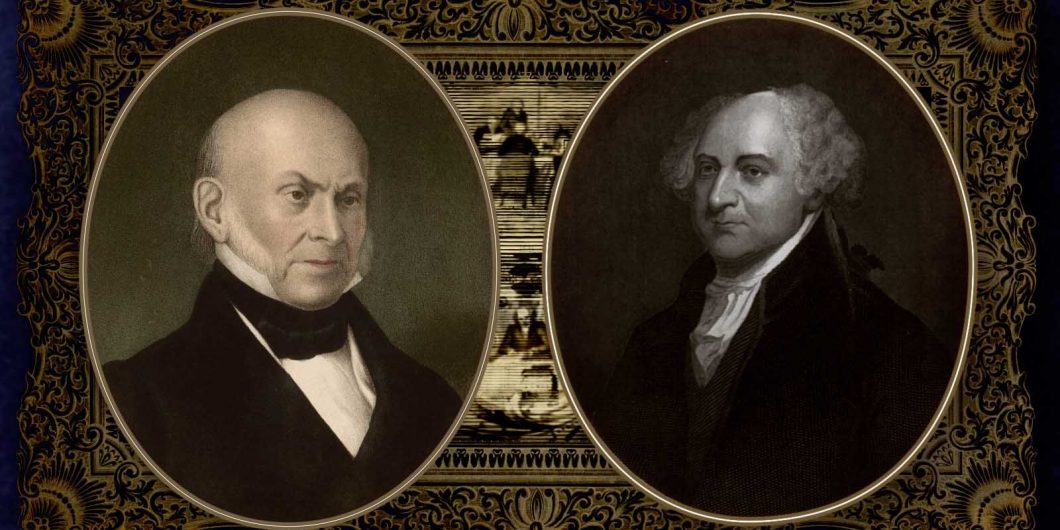Education and the Man According to John Adams
“All the End of Study is to make you a good Man and a useful Citizen.”
On May 18, 1781, John Adams wrote from Amsterdam to the not-yet-fourteen–year-old John Quincy Adams. His letter illustrates the classical character of the education of the Founding generation. Besides the study of Dutch, an opportunity afforded by their mission to Europe, John Quincy is, in good colonial fashion, immersed in the Latin language. Adams’s short letter contains an important lesson about the relation between civic and liberal education, one that we can follow if only we, like he, take our bearings from the classics.
Adams writes to his son:
You go on, I presume, with your latin Exercises: and I wish to hear of your beginning upon Sallust who is one of the most polished and perfect of the Roman Historians, every Period of whom, and I had almost said every Syllable and every Letter is worth Studying. . . .In Company with Sallust, Cicero, Tacitus and Livy, you will learn Wisdom and Virtue. You will see them represented, with all the Charms which Language and Imagination can exhibit, and Vice and Folly painted in all their Deformity and Horror. . . .You will ever remember that all the End of study is to make you a good Man and a useful Citizen.—This will ever be the Sum total of the Advice of your affectionate Father.
Horace famously said that poetry should both “instruct and delight.” This is true of the great historians as well. Adams recommends Sallust et al. for their aesthetic qualities, the “polish” and “charm” of their language. But this delight in the language, enabled by those laborious “latin Exercises,” is ordered toward the cultivation of John Quincy the man and citizen. It is part of an education to excellence. “In Company with” the Roman historians, John Quincy “will learn Wisdom and Virtue.”
“In Company with” suggests the possibility of becoming a peer or colleague to these great authors. What a contrast to the usual emphasis on this era’s approach to classical studies, of dull memorizing and drilling by cruel and incompetent schoolmasters! Adams himself suffered through colonial pedagogy, as documented by Carl Richard in The Founders and the Classics, but he is not denying (or even addressing) it here. Rather, he is describing the genuine friendship with the classical authors that he achieved after years of difficult schooling, presumably as an encouragement to John Quincy in the midst of his labors.
Why read old books? The Roman historians do not teach mere names and dates, and their teachings are not mere ornaments for gentlemen; they are the teachers of “Wisdom and Virtue.” On the one hand, “Wisdom” here seems to indicate the intellectual virtues, and in particular “practical wisdom” or “prudence” (Aristotle’s phronēsis), the intellectual excellence that governs moral actions, enabling a man to perceive and choose the course of action that is simultaneously noble and efficacious. “Virtue,” on the other hand, refers to moral virtue generally or some of the moral virtues, and perhaps patriotism, the virtue of a republican citizen, in particular. As Thomas Ricks describes it in his recent book on the topic, the Founders frequently spoke of civic virtue or patriotism as “virtue” simply.
The vocation of the classical historian is to “represent” wisdom and virtue “with all the Charms which Language and Imagination can Exhibit, and Vice and Folly painted in all their Deformity and Horror.” The classical historian is not a mere chronicler but a vivid “painter” of nobility and baseness, of the personal and political consequences of human greatness and human depravity. The “Charms” of virtue and “Deformity and Horror” of vice are portrayed by the classical historian as they are by a good poet then or a good filmmaker today, which is to say, vividly, realistically, and in a coherent plot signifying something.
As John Peterson has noted in a different context, the classical historian must be a kind of rhetorician and storyteller. Unlike the modern academic historian, Cicero understood that historians have “a civic responsibility” to tell a story that, “while saying nothing false,” nevertheless inspires the public “with a sense of its greatness.” Rhetoric is classically understood as a moral enterprise—persuasive speech that leads the souls of its audience to the truth—rather than a verbal form of mere power, as it is apparently viewed popularly today and in academic departments of “Rhetoric and Communication.” The classical historians wrote as citizens as well as scholars—citizens of this city rather than an abstract and deracinated “Republic of Letters” or, as we would put it today, as members of the “scientific community” or “scholarly community.”
But it is precisely in studying one’s own history, which would seem to be a task for civic education, that the classical historian addresses liberal education as well. Civic education is education to citizenship in this regime; liberal education, because it addresses the student’s humanity rather than citizenship or patriotism, is often thought to be irreducibly in tension with civic education. But this depends on what a human being is, and in what regime a student finds himself a citizen. If a human being is naturally political, and if a student’s political regime is one that requires and seeks to encourage human liberty, then a liberal education can contribute to one’s preparation for citizenship.
Adams concludes his letter to John Quincy by summing up the relation between civic and liberal education: “all the End of study is to make you a good Man and a useful Citizen.”
Livy, for example, introduces his history of Rome by declaring that the purpose of studying the roots of one’s own nation is to discover how one’s ancestors’ way of life contributed to the greatness of the nation and how the corruption of that way of life led to the corruption of the whole society. The student, in studying his nation’s history, finds “both examples and warnings” for “yourself and your country,” for the reader as a whole unto himself and the reader as a part of the civic whole. Livy understood the historian’s purpose as to explain the moral causes of Roman greatness and Roman decadence, and in the process to lay out a great store of exemplary and cautionary tales to his audience—examples for individual as well as civic emulation.
This is not an idiosyncracy of Livy, nor even of the Roman historians. Herodotus, Thucydides, and Plutarch all likewise describe their writing projects as eminently practical. We might say, using terms that they for the most part do not, that their historical writings are meant to aim at cultivating the Aristotelian virtue of prudence, of good judgment about political and human things. History is a practical science, as are economics, ethics, and politics in the classical mind. Though it is about the past, it is addressed to human agents in the present, who are able to make choices about how to live as individuals and as citizens. As Hobbes put it in the introduction to his translation of Thucydides:
The principal and proper work of history [is] to instruct and enable men, by the knowledge of actions past, to bear themselves prudently in the present and providently towards the future. […History is] the art by which the affairs both of armies and cities be conducted to their ends.”
A free government, one that offers to its people true liberty under just laws, requires a virtuous citizenry. But human excellence is what a liberal education aims at: the cultivation of the character and virtues of its students. In its most complete form, such education leads to the cultivation of the whole person, body and soul alike, and certainly including the moral as well as the intellectual virtues.
And so Adams concludes his letter to John Quincy by summing up the relation between civic and liberal education: “all the End of study is to make you a good Man and a useful Citizen.” To become “a good Man” is an end desirable for its own sake, irrespective of political conditions. As Glaucon says in Plato’s Republic, who, upon learning that virtue is to the soul what health is the body, would ask whether it is desirable to pursue? And it is by becoming good men and women that we might become “useful citizens.” The cultivation of practical wisdom, to which the study of history is especially addressed, is especially useful to citizens in a self-governing regime, for it is the virtue that enables us to “bear [our]selves prudently in the present and providently towards the future”: to judge characters, reason about policies, and make our way with somewhat greater light through the necessarily dim terrain of human affairs.
“This will ever be the Sum total of the Advice of your affectionate Father.” It is sound advice not only for the biological children of John Adams, but for all of us who are the civic sons and daughters of the Founding Fathers.


